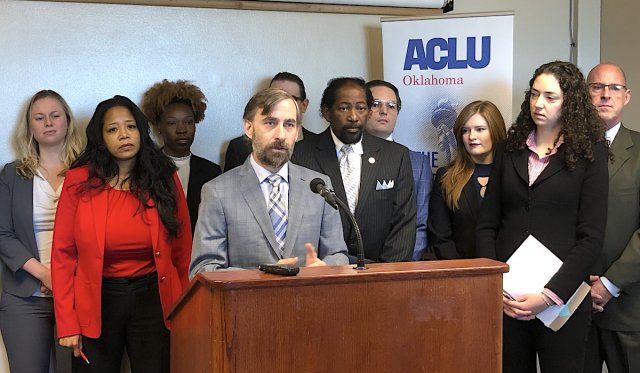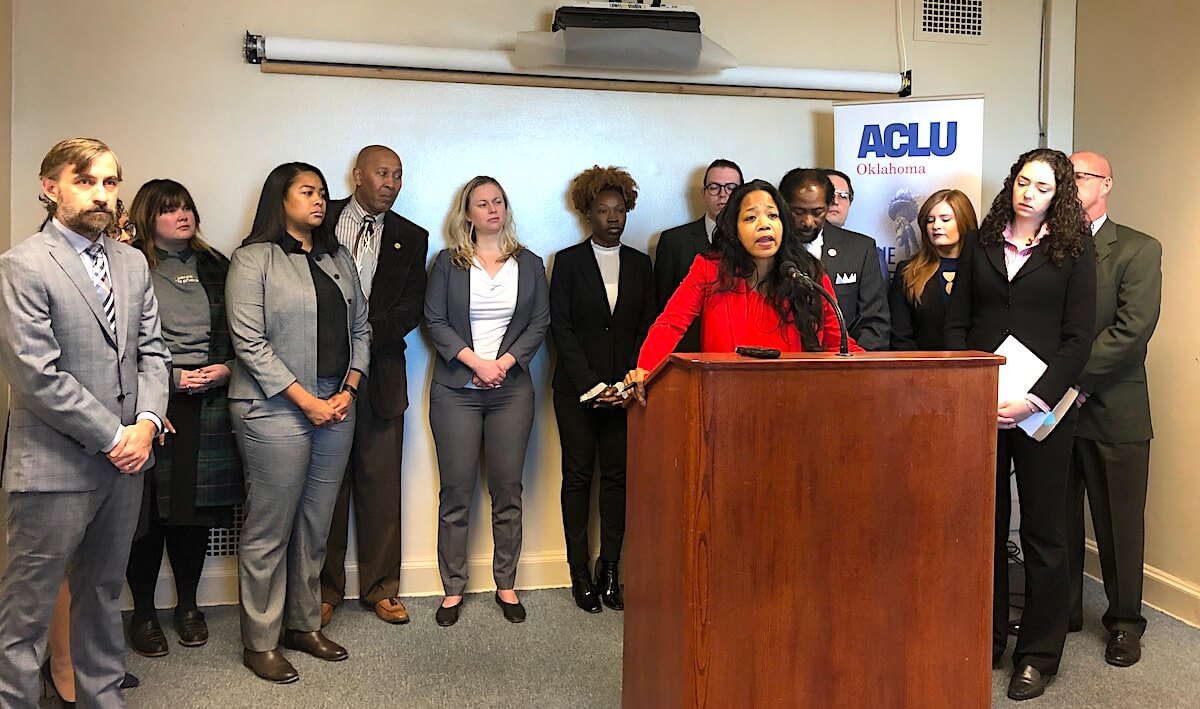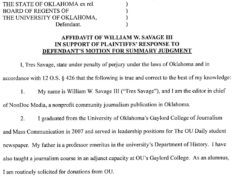

In a federal class-action lawsuit filed this week, local and national attorneys allege Canadian County’s pretrial detention system violates the Sixth and Eighth Amendments of the U.S. Constitution. The lawsuit focuses on how arrested individuals are assigned bail via judicial video conferencing without attorneys present.
“It’s not open to the public, and there are no witnesses. Friends and families and outsiders are not allowed to observe what happens at arraignment,” said Twyla Carter, a senior staff attorney with the American Civil Liberties Association and lead plaintiffs counsel. “The entire interaction lasts one to two minutes. The only questions that the judge will ask are the name of the person and whether or not they understand the charge. There is no lawyer present.”
Joined by ACLU of Oklahoma executive director Ryan Kiesel and a cadre of other attorneys, Carter laid out her team’s lawsuit and detailed the experience of their seven current clients, who are all incarcerated in the Canadian County Detention Center.
“If a person has a lawyer and has already applied and received a court-appointed [Oklahoma Indigent Defense System] attorney, they are then forced to choose between their constitutional right to keep that lawyer and their constitutional right to liberty,” Carter said. “That is because, in Canadian County, the way the process works is that when you apply for an attorney there, upon release — if you scrape together enough money to get out of jail — you will then lose your court-appointed attorney.
“The process I just described is not only wrong and unfair, more importantly it is wrong and unconstitutional.”
ACLU: ‘This is not isolated to a single county’
Constitutionality of the situation will ultimately be determined in a federal courtroom, though Wednesday morning it was not immediately clear who would lead the county in defense of the suit. A call to District Attorney Mike Fields, who represents Canadian, Garfield, Blaine and Kingfisher counties, was not returned by the publication of this story.
Alex Gerszewski, spokesman for Oklahoma Attorney General Mike Hunter, said their office was not involved.
Jari Askins, administrative director of the state’s court network, said Wednesday morning that she had not heard of the lawsuit.
“I have received no information regarding Canadian County,” Askins said.
Kiesel, a former state lawmaker who leads Oklahoma’s chapter of the ACLU, said lawsuits could also be filed against other counties on the same topic.
“This is not isolated to a single county,” Kiesel said. “We are here this morning to put every judicial district on notice that the continued use of unconstitutional bail practices will no longer be tolerated.”
Kiesel, Carter and Zoe Brennan-Krohn — a national ACLU attorney focused on disability rights — spoke about another component of their 56-page court filing (embedded below): an argument that the Canadian County court system is not screening for defendant disabilities that exacerbate their Six Amendment deprivation of counsel and Eighth Amendment excessive bail claims.
“This case is the first lawsuit in the country challenging the routine, pervasive disability discrimination that takes place in bail hearings across the country,” Brennan-Krohn. “Everyone held in Canadian County jail is suffering, but people with disabilities are suffering more acutely.”
Bureau of Justice statistics from 2011-2012 indicate that about 40 percent of people in American jails have disabilities. Conditions that impair a defendant’s ability to understand the pretrial detention process include auditory, learning and mental disabilities, according to Blake Johnson, a partner in Oklahoma City’s Overman Legal Group.
“Canadian County is not making any reasonable inquiry into whether or not the arrestees they are issuing bail orders on are disabled,” Johnson said prior to Wednesday morning’s press conference. “If it takes you longer to process information or you have a difficult time hearing or reading, then all of the problems we have already discussed are exacerbated significantly.”
‘You are on notice that you are violating the constitution’

Those problems, Johnson said, involve Oklahoma’s Uniform Bond Schedule functionally denying low-income defendants “an individualized consideration,” as well as the initial arraignment being conducted without the accused having access to legal counsel.
“We believe — and the case law on this question is pretty clear — that that initial appearance in front of a judge is a critical stage of the proceeding,” Johnson said. “At all critical stages of the proceeding, the defendant has the right to be represented by counsel. And how could you deny that a stage of the proceeding wherein I am told the conditions for my pretrial release is not critical?”
Carter, a former public defender in the state of Washington, said during Wednesday’s press conference, that Oklahoma judges who conduct such arraignments closed to the public and without a defendant’s lawyer present should put themselves in the accused’s shoes.
“If you have been accused of a crime or your children or your loved one have been accused of a crime, what sort of process would you expect to go through? What constitutional protections would you expect them to receive if they were going through the criminal legal system?” Carter said. “When no one from the outside can come, friends and family aren’t able to appear, no witnesses are there and no lawyer is present, what type of justice do you actually think you are providing to the citizens of Canadian County?”
She then spoke to any other Oklahoma judge conducting similar pretrial hearings.
“You are on notice that you are violating the constitution,” she said.
Kiesel emphasized that the physical circumstances by which judges address pretrial defendants matter.
“We are talking about antiquated technology that makes it very difficult to hear. You’re in a noisy, chaotic environment,” Kiesel said. “This is a very Orwellian process that is unfolding in Canadian County and, in fact, counties around the state.”
Johnson said the system in Canadian County and other parts of the state runs contrary to the purpose of bail bonding.
“Bail is not intended to keep people in jail prior to their trial. It is intended to provide surety that they will appear at trial,” Johnson said. “It is important that defendants are out of custody prior to trial. It is crucial that they are able to participate in their own defense.”
With more than 140,000 residents, Canadian County is the fourth most populous county in Oklahoma. Carter and Kiesel said Canadian County, which operates as Oklahoma District Court number 26, holds pretrial hearings on Tuesday and Thursday afternoons.
Last legislative session, SB 252 would have reformed some parts of Oklahoma’s bail system, though not all issues alleged in the ACLU lawsuit would have been addressed. SB 252 failed a House floor vote during the final week of the 2019 legislative session.
Read the full court filing
